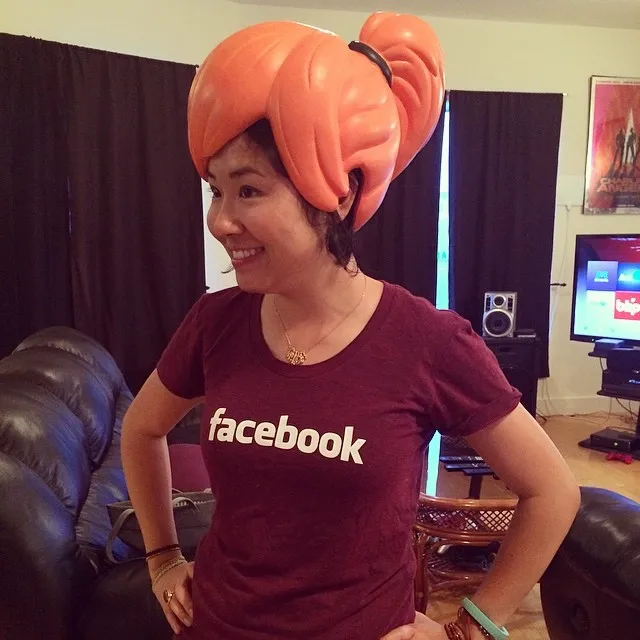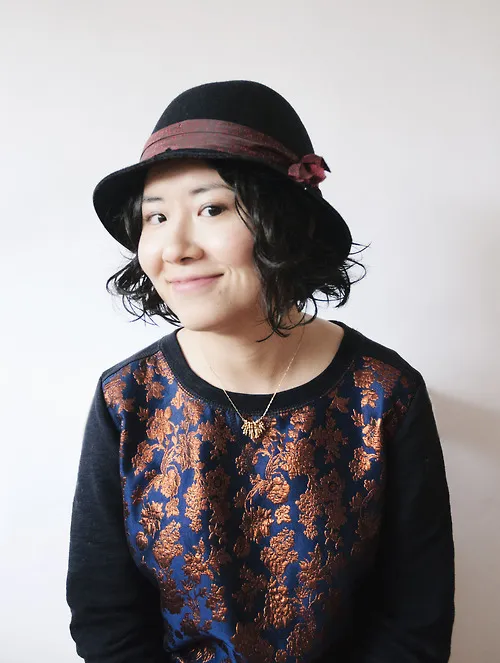Fearlessness is the context for all achievements: Bo Ren, Product Manager & Writer
Bo Ren is a Product Manager and is also a writer at Women 2.0. Bo has a rather unconventional career trajectory. From majoring in liberal arts to foraying into the tech world and writing, Bo has been fearless in her choices. Let us dive deeper and find out more about her story!

Immigrant daughter in the United States
I was born in Xian, China, and immigrated to the United States when I was four and a half. My dad came to the U.S. to study on a World Health Organization Fellowship at the University of Michigan. Our family stayed in the U.S. so my dad could pursue a career in hearing science research. We lived in Ann Arbor, Michigan, for three years before moving to Portland, OR, where I spent the remainder of my childhood.
My earliest childhood memory goes back to when I was about two years old. I asked my dad, “how many stars are there in the universe?” He furrowed his brows, paused, and said, “I don’t know.” His honest answer shocked my two-year-old conscience. I was so disappointed. For some odd reason, I thought that all adults grow up to be perfect, omniscient beings. Funny, right? I don’t know where the idea came from. I started counting all the stars in the sky at night. Obviously, there were too many to count…I lost track after 500.
From an liberal arts major to product manager at Facebook
I attended a liberal arts oriented public high school in downtown Portland. Lincoln High School was best known nationwide for its constitution and debate teams. There I joined the debate team which changed my life. Before debate I was a nervous wallflower, after debate I freely spoke my mind and felt more confident about myself. Debate taught me how to write, defend my thesis, and apply philosophy to real world arguments.
Torn between small liberal arts colleges and a full ride scholarship to USC (University of Southern California), I chose USC because it made the most financial sense. I am incredibly grateful for USC’s Trustee Scholarship which took the financial burden off my parents. At first, I felt lost in a big university system but found my grounding thanks to like-minded friends and reading lots of Foucault.
I changed majors often. One day I was a biology major, another day I was an art history major and then a philosophy major. Finally I double majored in economics and psychology with a focus on neuro-economics. The dean was so forgiving about my fickleness.
College taught me to be a generalist and to think critically for myself. I remember crashing a business seminar taught by Jessica Jackley, cofounder of Kiva. We read case studies about startups, b-corps, and social enterprises. It blew my mind that you could fuse a social mission with a private business model. Jessica taught me to fail quickly, develop my risk appetite, and learn the art of storytelling. And to think about it, I wasn’t even registered for the course.
I believe we do a lot of “background learning” in college that indirectly apply to specific jobs and tasks. It’s funny how nothing I studied in college directly applies to what I do today. In fact, I didn’t know product management existed as a profession in college. Instead college helped shape the right personality and critical thinking abilities to pick up the skills to be a product manager.
Writing on women related issues and work

I write for relief. Writing teaches me vulnerability, which is emotional currency for courage. I wish vulnerability was valued more by companies and societies because we have a to learn from each other when we share our true feelings and stories. Because I write about my own experiences, I open myself up for personal attacks and misperceptions but that is a risk worth taking. I’ve learned that writing about what scares me resonates.For me, writing starts with a feeling. Some degree of unprocessed emotion fuels my writing. I tend to get stuck on a feeling for a couple of days. That feeling builds to a point where I have to produce something. I write about my own experiences in work and life because it hasn’t been easy. Writing helps me process my emotions and synthesize experiences. Not all that glitters is gold in the start up/tech world. The tech industry is as messy and chaotic as exciting and glamorous. I choose to write about the cracks and fissures because that’s where growth happens.
Essentials of a good Product Manager, and life’s lessons
Product management is probably one of the fuzziest spaces in tech because it varies so much by company. A product manager at company X could be a product marketer at company Y or a product designer at company Z. Variations aside, I think a good product manager across the board is a janitor, curious thinker, and armchair psychiatrist.
Why janitor? You clean up on unglamorous pieces of the product ( legacy problems like technical debt) and schlep and herd the team to launch on time. Why curious thinker? You’re always thinking ahead of engineering and design cycles. It’s not enough to just ship a product on time; you have to anticipate new features and tweaks like how to get from a iPhone 5s to iPhone 6. Why armchair psychiatrist? This is my favorite part–because you get to talk to users to really understand what makes them tick, and dig under the surface level issues for root causes.
A good product manager humbly listens first and acts second. A good product manager doesn’t manage engineers; you work alongside people who are oftentimes smarter than you. A good product manager anticipates problems and sees the product for what it could be. A good product manager communicates openly to her team and takes full responsibility for the product. She measures the product’s success as her success.
Rotational Product Management at Facebook
As a millennial and former internet kid, there is no denying the web has shaped my identity, social connections, and world view. I think it’s crucial to be an end user of the product you are building, so you have an emotional connection with it. I joined Facebook’s Rotational Product Management Program (http://www.fbrpms.com) for a wide exposure to high impact projects. The program invests in a diverse bunch and trains them to be well-rounded product managers. Facebook has really opened the doors to a more diverse, non-technical backgrounds which is a huge step in solving Silicon Valley’s diversity problem. This program starts in August and I am excited to join!
I get excited about building a product that encourages people to connect in meaningful ways, share positive content, and ultimately, connect the world (internet.org). It is my personal mission to help make the internet a safer and more positive place for people to be visible, open, and vulnerable. As a psych nerd, I am excited that Facebook has the richest user data in the world — with that comes great responsibility. We owe it to ourselves to use that data for good and help further shared humanity.
Key learnings from my career and my inspiration

I wish someone would have told me it is okay to be scared, be bold, and take risks. Growing up in an immigrant family I was raised on a strict diet of risk-aversion, hard work with a dose of survivalist pessimism, and relentless practicality. I often think about how the bamboo ceiling and survivalist immigrant mentality shapes me in the workplace. Sometimes I have to rewire my brain to think differently. Deciding not to pursue law school was the pivotal moment where I chose to carve my own path and live an authentic life. My goal is to build products that help the ‘un-exotic’ middle class instead of the 1%. Oh, and also to have fun while doing it! (smiles)I am inspired by fearlessness, good design, and shared humanity. Sometime my parents remark I am “too brave” and my dad gripes that I “keep changing” l but I don’t think those are bad things. My favorite PM writer and friend Ellen Chisa wrote, “Being fearless is about knowing what risks are worth taking. The combination of passion and fearlessness means that some attempts will work out and others won’t. Fearlessness is the context for all future accomplishments.”
Good design drives my way of thinking and seeing the world. I love design that combines efficiency, function, and aesthetics. Shared humanity is a mindset I try to cultivate day to day. I want to be able to understand what is at stake or others. My personal goal is to be able to converse with anyone from all walks of life.
Honestly, I don’t believe in one calling per se. My calling will probably keep changing. Those close to me know that I change often (my hair, my style, my hobbies etc).There’s some degree of fickleness in all creative types I think. Creative people find inspiration in whimsical moods and fleeting thoughts so our calling will keep changing. I know for sure my calling has to do with people and shared humanity. I am fascinated by different cultures, disciplines, philosophies, and ideas. To me, meeting new people, and striking that initial conversation is magic.
My advice to young Indian women looking to start their careers
1. Stay Curious – Read a lot. I am constantly reading thought-provoking articles and blog posts from information brokers on Twitter, Medium, and Facebook. I use Pocket to collect and prioritize my online readings. I’m also a huge Quora user and frequently post and answer questions on it.
2. Write a lot. No one ever told me the importance of writing in tech. The words you use shapes how people interpret your message and perceive you. How you say something is just as important as what you say. Build the right syntax, vocabulary, and craft your message with finesse starting at text messages and emails.
3. Be fearless – If someone says you can’t do something, prove them wrong and end up doing it for yourself. I’ve had countless people tell me at one point, I don’t think you should go into product management because of X, Y, and Z. Their skepticism just fueled my determination to crack into product and prove them wrong.
4. Don’t be worried about taking an entry level job. My first corporate job was a customer service representative. Angry customers yelled at me for hours on end but it helped me become a good listener. I got really good at understanding human motivations and getting to the root of a user’s frustrations.
5. Grab coffee with interesting people. I use CoffeeMe.in and Highlight to meet like-minded people in tech and locals while traveling. It never hurts to grab coffee with new people, hear their stories, and pick their brains. I try to meet two new people a week so my universe is always expanding.
Ultimately, career development is about meeting great people, killing it at your current job, and making your side project your full project. There is no linear path anymore so enjoy the detours while you carve your own path!







